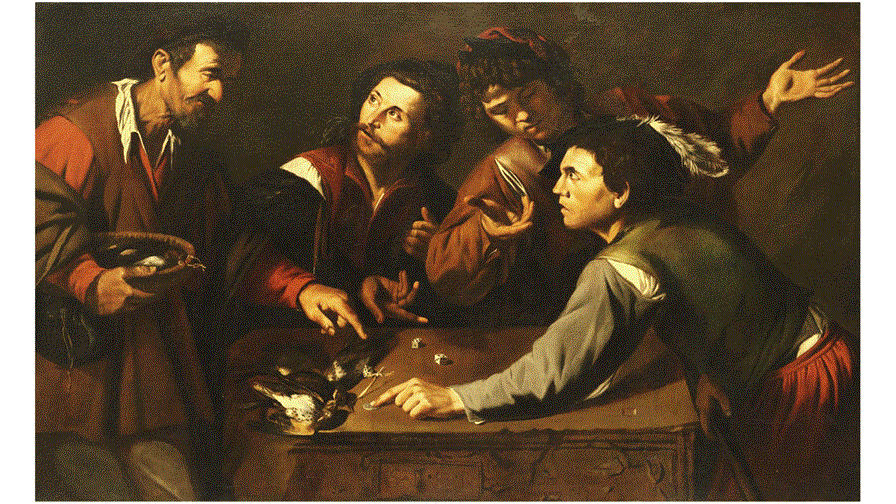.
Rolling the Dice
“Spontaneous creation is the reason there is something rather than nothing,
why the Universe exists, why we exist.” —Stephen Hawking, The Grand Design
At the start of creation, before the beginning,
we’re told there was nothing, except two dice spinning
somewhere beyond time, but when they worked in tandem,
they made all there is through events that were random.
Those dice kept on randomly rolling and tumbling,
and every so often, they found themselves stumbling
upon an advancement that was monumental,
but each such occurrence was quite accidental.
The dice kept on rolling, eventually giving
the universe miniature cells that were living
which over time, through tiny random mutations
made humans, and so many other creations.
Those dice, we’ve been told by our scholarly betters,
wrote DNA words that have billions of letters
by unguided chance rolling billions of aces,
and somehow, they do so while keeping straight faces.
But people with normal brains think it’s a dumb thing
to argue that nothing plus chance must make something.
To them, making spacetime and tuning it finer
demands an intelligent, timeless designer.
.
.
Warren Bonham is a private equity investor who lives in Southlake, Texas.















What a great concept and brilliant presentation, Warren!
I’m really glad you enjoyed it!
The fact that the universe works like a timed machine within each galaxy, within each solar system, is also our proof, I believe.
I couldn’t agree with you more. Random chance quickly leads to chaos given how unlikely non-chaotic outcomes are. We don’t see evidence of chaos in the galactic machinery.
As a result of infinity, everything that can possibly happen will eventually happen. The design and the designer are one and the same, capable of being an infinite amount of seemingly separate entities simultaneously and forever.
Great topic and poem, Warren!
I’m glad you enjoyed it! My finite brain has never been able to grasp the concept of infinity. Stephen Hawking had a much better brain than I do, but I always struggled with his explanations on such weighty topics. Despite the likely futility, it’s always fun to puzzle over.
Warren, this is a poem to make the intelligent reader happy. Starting with the idea of spontaneity or chance, you take dice as the symbol of how everything came into existence. In splendid rhyme and rhythm, you explain the universe creating itself through an almost unlimited number of rolls. You’ve done well to avoid any mention of infinity or infinities, for when infinity appears in a model, it is considered an inadequate description of reality–for mathematical and physical reasons. No calculations can be done with infinity, and thus chance ceases to apply. But in this relatively short poem, you manage enough irrational mutations to please the logical thinker in moving to intelligent design as the more likely mode of creation. Your single absurd equation (“nothing plus chance must make something”) allows the human brain to relax into a concept it can comprehend.
Your word choices echo the debate which is, admittedly, fun for theoretical physicists who have nothing practical (except scholarly prestige and position) riding on it. But all along you champion the human being who thinks of the world as he can see and feel it. Satisfying and logically flawless!
I cut the Hawking quote short, but it went on to say that “because there is a law such as gravity, the universe can and will create itself from nothing.” I think this exemplifies your statement about theoretical physicists very clearly. This seems like an absurd statement, but it is accepted by many because it was uttered by someone who was so obviously gifted intellectually.
Thanks as always for the very careful and thoughtful read!
Ditto to Roy Eugene Peterson’s comment. Not only do I agree, I love the poem.
I’m glad this one hit home with you!
The modern notion that we should conceive of our lives as a mysterious expression of dead material processes has always seemed to me the child of idolatry- the notion that the worship of higher life is best expressed in material, man-made, handmade statues fashioned of dead things. “Those who make them become like them.”
Excellent argument in verse.
I haven’t heard that expression before (those who make them become like them) but I will definitely do so going forward. I’m glad you enjoyed this one.
I believe Dan is referring to a few verses (15-18, especially 18) of Psalm 135, expounding on the foolishness of making and worshipping idols, in contrast to worshipping the true God.
I ditto both Roy and jd. Brilliant work Warren!
Warren, this is a tough subject to tackle in a poem and you have managed to create an intriguing, non-random read on an age-old, ongoing argument I am certain will continue ad infinitum. To my curious mind, you have dealt with the subject matter beautifully… especially in the closing stanza. Thank you!
Some One had to roll the dice. Enjoyed this. Thank you.